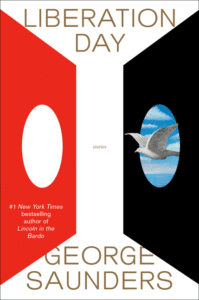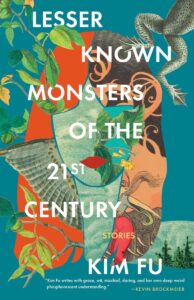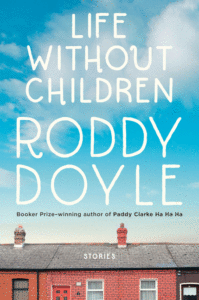The Best Reviewed Short Story Collections of 2022
Featuring George Saunders, Ling Ma, Colin Barrett, Jamil Jan Kochai, and More
We’ve come to the end of another bountiful literary year, and for all of us review rabbits here at Book Marks, that can mean only one thing: basic math, and lots of it.
Yes, using reviews drawn from more than 150 publications, over the next two weeks we’ll be calculating and revealing the most critically-acclaimed books of 2022, in the categories of (deep breath): Fiction; Nonfiction; Memoir and Biography; Sci-Fi, Fantasy, and Horror; Short Story Collections; Essay Collections; Poetry; Mystery and Crime; Graphic Literature; and Literature in Translation.
Today’s installment: Short Story Collections.
Brought to you by Book Marks, Lit Hub’s “Rotten Tomatoes for books.”
*
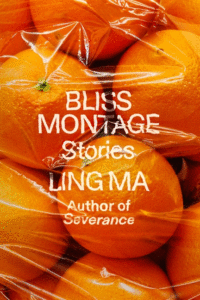
1. Bliss Montage by Ling Ma
(Farrar, Straus and Giroux)
21 Rave • 5 Positive • 2 Mixed
Read an interview with Ling Ma here
“The eight wily tales mark the return of an author whose inventive debut, Severance, urgently announced her as a writer worth watching … an assured follow-up, a striking collection that peddles in the uncanny and the surreal, but it often lacks Severance’s zest. Some stories are confident in their strangeness and ambiguity, a handful feel like promising sketches of sturdier narratives and the rest fall somewhere in between. The connections between them are loose, tethered by similar leads …
Wry, peculiar stories like Los Angeles and Yeti Lovemakingconfirm that Ma’s imagination operates on the same chimerical frequency as those of Helen Oyeyemi, Samanta Schweblin, Meng Jin. Each of these stories leans un-self-consciously into the speculative, illuminating Ma’s phantasmagoric interests. They are funny, too … Despite their nagging loose ends, Ma’s stories stay with you—evidence of a gifted writer curious about the limits of theoretical possibility. They twist and turn in unpredictable ways and although the ride wasn’t always smooth, I never regretted getting on.”
–Lovia Gyarkye (The New York Times Book Review)
2. Liberation Day by George Saunders
(Random House)
16 Rave • 6 Positive • 5 Mixed (86)
Read George Saunders on reading chaotically and the power of generous teachers, here
“Acutely relevant … Let’s bask in this new collection of short stories, which is how many of us first discovered him and where he excels like no other … Saunders’ imaginative capacity is on full display … Liberation Day carries echoes of Saunders’ previous work, but the ideas in this collection are more complex and nuanced, perhaps reflecting the new complexities of this brave new world of ours. The title story is only one of a handful of the nine stories in this collection that show us our collective and personal dilemmas, but in reading the problems so expressed—with compassion and humanity—our spirits are raised and perhaps healed. Part of the Saunders elixir is that we feel more empathetic after reading his work.”
–Scott Laughlin (The San Francisco Chronicle)
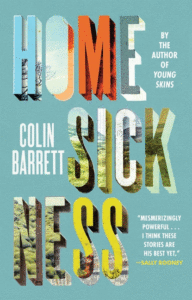
3. Homesickness by Colin Barrett
(Grove Press)
16 Rave • 1 Positive • 1 Mixed
Read an essay by Colin Barrett here
“Its comedy stands in balance to the collection’s more tragic tenor … expands [Barrett’s] range, and though the first took place in the fictional Irish town of Glanbeigh, the books share a fabric shot through with dark humor, pitch-perfect dialogue and a signature freshness that makes life palpable on the page. The language counterpoints the sometimes inarticulate desperation of the working-class characters, and that dissonance lends an emotional complexity to their stories …
As a writer, Barrett doesn’t legislate from the top down. His unruly characters surge up with their vitality and their mystery intact. Their stories aren’t shaped by familiar resolutions—no realizations, morals or epiphanies. The absence of a conventional resolution does risk leaving an otherwise charming story like The Silver Coast with the rambling feel of a slice of life. But in the majority of the stories in this book, to reinvent an ending is to reinvent how a story is told, and overall, Homesickness is graced with an original, lingering beauty.”
–Stuart Dybek (The New York Times Book Review)
4. Lesser Known Monsters of the 21st Century by Kim Fu
(Tin House)
13 Rave • 4 Positive
Read a story from Lesser Known Monsters of the 21st Century here
“..the horrors are more intimate, smaller, and less global in scale. This is not a collection filled with fantastic beasts, although a sea monster does make an appearance, but instead illuminates the monstrous nature of humanity … Technology, rather than magic, catalyzes these changes. That is not to say there are not some traces of unexplained fantasy, such as a girl who sprouts wings from her ankles, but mostly, Fu’s monsters manifest from modernity … The success of Kim Fu’s stories is the element of the unexpected. There are surprises lurking in these narratives, whether it is a quick final plot twist or unexpected peculiarity …
Although Fu seems more concerned with alienation stemming from individual relationships, there is criticism of conventional consumer capitalism … The characters in Fu’s collection are eccentric and unexpected in their choices, and many of their stories feature unforeseen endings that strike the right tone for the dark era we live in … Fu opens a window looking onto the sad possibilities of our own failures.”
–Ian MacAllen (The Chicago Review of Books)
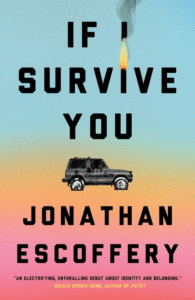
5. If I Survive You by Jonathan Escoffery
(MCD)
12 Rave • 4 Positive
Read an essay by Jonathan Escoffery here
“Ravishing … The book, about an immigrant family struggling to make ends meet, delights in mocking the trope of an immigrant family struggling to make ends meet … There’s peacocking humor, capers, and passages of shuddering eroticism. The book feels thrillingly free … Escoffery’s protagonists, though resourceful, can’t accomplish the impossible; nor do they sacrifice themselves for the reader’s sentimental education … The prose comes alive …
These characters are strange amalgams of limited agency and boundless originality. Their survival, perhaps, comes down to their style … Escoffery deftly renders the disorienting effects of race as they fall, veil-like and hostile, over a world of children … Throughout, the refrain runs like an incantation: What are you? Escoffery, hosing his characters in a stream of fines, bills, and pay stubs, studies the bleak math of self-determination.”
–Katy Waldman (The New Yorker)
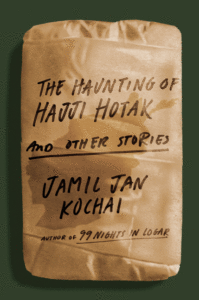
6. The Haunting of Hajji Hotak and Other Stories by Jamil Jan Kochai
(Viking)
12 Rave • 1 Positive • 1 Mixed
Read an essay by Jamil Jan Kochai here
“Kochai, an Afghan-American writer, shapes and reshapes his material through a variety of formal techniques, including a fantasy of salvation through video gaming, a darkly surrealist fable of loss, a life story told through a mock résumé, and the story of a man’s transformation into a monkey who becomes a rebel leader…Like Asturias, Kochai is a master conjurer…The collection’s cohesion lies in its thematic exploration of the complexities of contemporary Afghan experience (both in Afghanistan and the United States), and in the recurring family narrative at its core: many of the stories deal with an Afghan family settled in California… Kochai is a thrillingly gifted writer, and this collection is a pleasure to read, filled with stories at once funny and profoundly serious, formally daring, and complex in their apprehension of the contradictory yet overlapping worlds of their characters.”
–Claire Messud (Harper’s)
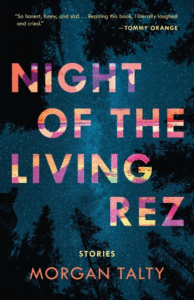
7. Night of the Living Rez by Morgan Talty
(Tin House Book)
12 Rave • 1 Positive • 1 Mixed
Listen to an interview with Morgan Talty here
“Talty depicts the relationship between David and Paige perfectly—the siblings clearly care for each other; it’s evident beneath the bickering and the long periods when they don’t see each other … The story ends with both mother and son experiencing terrifying medical emergencies; it’s almost excruciating to read, but it’s undeniably powerful, and, in its own way, beautiful … Talty’s prose is flawless throughout; he writes with a straightforward leanness that will likely appeal to admirers of Thom Jones or Denis Johnson. But his style is all his own, as is his immense sense of compassion. Night of the Living Rez is a stunning look at a family navigating their lives through crisis—it’s a shockingly strong debut, sure, but it’s also a masterwork by a major talent.”
–Michael Schaub (The Star Tribune)

8. How High We Go in the Dark by Sequoia Nagamatsu
(William Morrow)
10 Rave • 6 Positive • 1 Mixed • 1 Pan
Read an excerpt from How High We Go in the Dark here
“If you’re a short-story lover—as I am—you’ll be impressed with Nagamatsu’s meticulous craft. If you crave sustained character and plot arcs, well, you’ll have to settle for admiring the well-honed prose, poignant meditations and unique concepts. Hardly small pleasures … The reader might best approach the book like a melancholy Black Mirror season … This is a lovely though bleak book. Humanity has long turned to humor in our darkest moments, but levity feels absent even in a chapter narrated by a stand-up comedian. That said, the somber tone unifies the disparate characters and story lines … a welcome addition to a growing trend of what we might call the ‘speculative epic’: genre-bending novels that use a wide aperture to tackle large issues like climate change while jumping between characters, timelines and even narrative modes … Nagamatsu squarely hits both the ‘literary’ and ‘science fiction’ targets, offering psychological insights in lyrical prose while seriously exploring speculative conceits … a book of sorrow for the destruction we’re bringing on ourselves. Yet the novel reminds us there’s still hope in human connections, despite our sadness.”
–Lincoln Michel (The New York Times Book Review)
9. Life Without Children by Roddy Doyle
(Viking)
9 Rave • 5 Positive • 1 Mixed
“… a quietly devastating collection of short stories that brilliantly portrays the pervasive sense of hopelessness that immobilised us during the dog days of Covid … Lest he be accused of focusing too much on men and their sense of victimhood, the countervailing magnificence of his women is worth noting. Part of Doyle’s genius resides in a kind of bathetic amusement at the follies of his male characters and always it’s the stoical good sense of women that saves the day … Another of his great strengths is the ability to drop in those little epiphanies that resolve the tension and conflict of a story in a single significant moment … Doyle breaks our free fall into despair by emphasizing the redemptive power of humor, love and the kindness of strangers.”
–Bert Wright (The Sunday Times)

10. Stories From the Tenants Downstairs by Sidik Fofana
(Scribner)
12 Rave
Read an interview with Sidik Fofana here
“… outstanding … The brilliance of this debut, however, is that Fofana doesn’t let anyone go unseen … masterfully paints a portrait of the people most impacted by gentrification … Fofana brings his characters to life through their idiosyncratic speech patterns. Auxiliary verbs are dropped, words are misspelled, prepositions are jostled, all to create a sense of vernacular authenticity…Grammar is an instrument that Fofana plays by ear, to much success.”
–Joseph Cassara (The New York Times Book Review)
*
Our System:
RAVE = 5 points • POSITIVE = 3 points • MIXED = 1 point • PAN = -5 points



